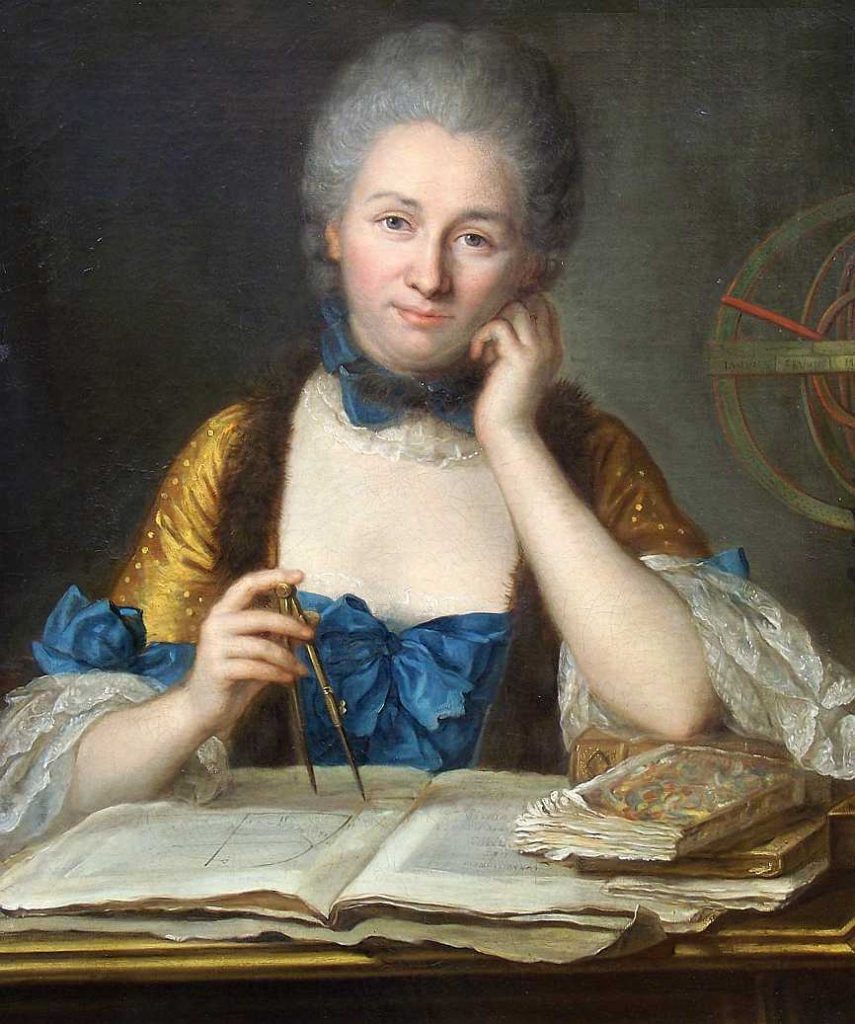In the early Eighteenth Century, intellectual themes were not part of women’s duties, and it was frowned upon for women to research and question. That is why it is so extraordinary that Émilie du Châtelet, a French woman, became a mathematician and scientist. Voltaire told the king of Prussia, Frederick the Great, in a letter that Châtelet was “a great man whose only fault was being a woman.”1
In 1706, when Émilie du Châtelet was born, French society had restraints on women that men did not face, such as not having real access to education. In Early Modern France, “the state would control the fathers, the fathers would control the families.”2 However, the Enlightenment Era did bring about enough change in France so that it was possible for Châtelet to become educated and advance in her career.3 She was lucky in the fact that she had an “unusually enlightened” father who gave Châtelet such a good education. She was educated in Latin, Italian, English, Spanish, Greek, Mathematics, Astronomy, Geography, and Poetry. Her mother also encouraged her and reflected a “cultivated background.”4
Châtelet changed and influenced society through her work on mathematics and scientific works. She published an introduction to Newtonian mechanics in 1740, and she even translated Newton’s Principia into French, with comments explaining the difficult mathematics to a popular audience.5 This was significant because not only could more of the population now read the works of Newton, but because of her commentary, more of the population could now understand it. It also introduced Newton into mainstream French scientific life. She went into detail on Newton’s theory of Gravity and she recast many of Newton’s theories and results in the “more powerful and suggestive notation of…. Calculus.”6 This had a great effect on the other scientists and mathematicians of the time. Châtelet’s work helped others to understand the complicated Newtonian system. By exploring Newton’s theses, and writing them for the educated public to read, Châtelet changed France.

Châtelet was married in June 1725 to Florent-Claude, marquis du Châtelet and count of Lomont. However, after only three years with her, he left to pursue a military career and rarely visited her. This is when Châtelet began an affair with Voltaire, another lover of Math and Science.7 In order to get her works published, Châtelet had to have Voltaire co-author them with her, but only his name appeared on the front cover. Emily Grosholz writes that Voltaire had not mastered the mathematics from the Principia, but instead relied on Châtelet to “write the technical sections of the book” he was writing called Elements of Newton’s Philosophy.8 Châtelet also discussed research on the solar system, electricity, and magnetism. She had just finished her translation of the Principia, when she died of “childbirth fever,” from a scandalous pregnancy with Voltaire.9
In her unusual career, Émilie du Châtelet worked with other famed scholars and succeeded in making mathematics a language that many more people could understand. As a woman, she opened the doors for other women to follow in her footsteps and she changed the world with her concepts and understandings of these men’s topics.
- Jerry Bentley, Herbert Ziegler, and Heather Streets-Salter, Traditions and Encounters: A Brief Global History, 4th ed., vol. 2 (McGraw Hill Education, 2016), 390. ↵
- James B. Collins, “The Economic Role of Women in Seventeenth-Century France,” French Historical Studies 16, no. 2 (Fall 1989): 436. ↵
- Ruth Hagengruber, “Emilie Du Châtelet, 1706–1749: Transformer of Metaphysics and Scientist,” The Mathematical Intelligencer 38, no. 4 (December 1, 2016): 1. ↵
- Ruth Hagengruber, “Emilie Du Châtelet, 1706–1749: Transformer of Metaphysics and Scientist,” The Mathematical Intelligencer 38, no. 4 (December 1, 2016): 2. ↵
- Emily Grosholz, “Candles in the Dark: Emilie Du Chatelet and Mary Somerville,” The Hudson Review, no. 4 (2013): 669. ↵
- Emily Grosholz, “Candles in the Dark: Emilie Du Chatelet and Mary Somerville,” The Hudson Review, no. 4 (2013): 669. ↵
- Complete Dictionary of Scientific Biography, 2008, s.v. “Châtelet, Gabrielle-Émilie Le Tonnelier De Breteuil, Marquise Du.” ↵
- Ruth Hagengruber, “Emilie Du Châtelet, 1706–1749: Transformer of Metaphysics and Scientist,” The Mathematical Intelligencer 38, no. 4 (December 1, 2016): 2-3. ↵
- Emily Grosholz, “Candles in the Dark: Emilie Du Chatelet and Mary Somerville,” The Hudson Review, no. 4 (2013): 669. ↵



81 comments
Cameron Adelman
Cool article. You picked a solid topic and have a great grasp of the broad strokes of article writing (i.e. organizing and composing the overall flow of the article), but make sure you spend some time focusing on the small details. For instance, you have several capitalization errors throughout your article. These errors are fairly insignificant in the grand scheme of things, but they can undermine your credibility if they’re too pervasive. Other then that, great article. I look forward to reading your next one.
Danny Rider
Great writing, amazing story.
Niki
Great story Bailey. I am excited to see all of your future work. I love that you are shedding light on what seems a woman fighting for equal rights.
Beverly Brock
I was not familiar at all with this 18th century female mathmetician and scientist. Through this article, I learned about this amazing intellectual woman who had a tragic end to her life.
This was a very interesting article that was well written.
Luke Trevino
Great essay!! I never knew of Émilie du Châtelet and her story. It is amazing that such a big part of our understanding comes through her handy work! It’s awesome how she translated Isaac newtons work so other scientist could understand. She is truly a great role model for woman all over the world. She stood up against all odds and became a scientist in a world were woman would have never done that.
LaShell Bartholow
What a great article. I, too, have not read or heard about her.
Kristine Stephenson
Loved this, Bailey! I am very familiar with Voltaire and his works, but was fascinated to read about this mistress of his who was such an educated, forward-thinking woman. Great article!!
Kris W.
Very interesting!
Elizabeth Edmiston
I will be happy to admit I have never heard of this woman. But after getting this small glimpse of her life, her work and her progressive upbringing, I would enjoy reading a biography.
Heather Davis
Very interesting article. She was definitely a trailblazer for her time in history!